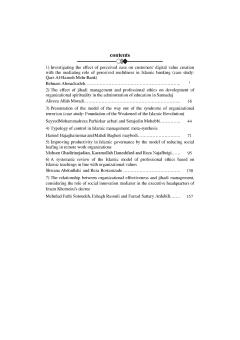The relationship between organizational effectiveness and jihadi management, considering the role of social innovation mediator in the executive headquarters of Imam Khomeini's decree
Subject Areas : Jihadi managementMehrdad Fathi sotoudeh 1 , Eshagh Rasouli 2 * , Farzad Sattari Ardebili 3
1 - PhD Student, Department of Management, Ardabil Branch, Islamic Azad University, Ardabil, Iran
2 - Assistant Professor, Department of Management, Ardabil Branch, Islamic Azad University, Ardabil, Iran
3 - Assistant Professor, Department of Management, Ardabil Branch, Islamic Azad University, Ardabil, Iran
Keywords: organizational effectiveness, jihadi management, social innovation, executive staff ,
Abstract :
This study deals with determining the relationship between organizational effectiveness and jihadi management, considering the role of social innovation mediator in the executive headquarters of Imam Khomeini's decree. In this research, the research method used is descriptive (correlation). The statistical population of this research includes; All the employees of the executive headquarters of the decree of Imam Khomeini (RA) who were working in the country in 1402, 200 of them were selected and studied by sampling method. In this study, in order to collect data, we have used 3 questionnaires, which include; Davari and Rezazadeh Jihadi Management Questionnaire, Parsons Organizational Effectiveness Scale (AGIL) and Balut et al.'s Social Innovation Questionnaire, whose validity and reliability were confirmed by professors and experts in the field of management. By using SPSS and Liesel software, inferential statistics methods such as correlation method and regression analysis method were used to analyze data and test hypotheses. Based on the results of statistical analysis, it was found that the relationship between jihadi management and organizational effectiveness is positive and significant, considering the mediating role of social innovation in the studied statistical community.
اجاقوند، مسعود و جعفری، محمد،(1397)،رابطه مدیریت جهادی با میزان اثربخشی سازمانی (مورد مطالعه: پلیس آگاهی استان همدان)، https://civilica.com/doc/1192312
آقايي، م، آقايي، ا؛ (١٣٩٦).بررسي تأثير مديريت جهادي بر احساس امنيت شغلي كاركنان، فصلنامهی نظارت و بازرسي، شماره ٤١ ، صص112 – 101 .
پورصادق، ن؛ ذاكري قزاآني، ز؛ (1394). بررسي تأثير مديريت جهادي بر اثربخشي سازمان در سه بعد رهبر، پيرو و مينه، پژوهشنامه مديريت منابع انساني دانشگاه جامع امام حسين(ع) ، سال ٧، شماره ٤، صص 116 – 95 .
تولايی، روحالله؛ شکوهيار، سجاد ؛ (1393). ارزيابی مؤلفه هاي مديريت جهادي بر عملکرد سازمانی با رويکرد کارت امتيازي متوازن. چشمانداز مدیریت دولتی، شمارهی 19، صص 37 – 15.
حیدری، مرتضی، شعبانی بهار، غلامرضا، عرفانی، نصراله، و سلیمانی، مجید. (1397). تدوین مدل ساختاری نوآوری سازمانی بر اساس سرمایه اجتماعی در بین کارکنان وزارت ورزش و جوانان جمهوری اسلامی ایران. مطالعات مدیریت رفتار سازمانی در ورزش، 5(4 (پیاپی 20) )، 53-64. SID. https://sid.ir/paper/378323/fa
زين الديني، م، محمّدي سياهبومي، ح. (١٣٩٧). ارائه الگوي مطلوب مديريت جهادي در انقلاب اسلامي (موردكاوي رهنمودهاي رهبر انقلاب اسلامي)، پژوهشنامه انقلاب اسلامي، سال ٨، شماره ٢٨ ، صص ٤٩ – 23
سرفرازی, مهرزاد؛ هاشمی, سید محمود؛ (1400). سنجش اثر گذاری مدیریت جهادی بر رفتار نوآورانه و خلاقیت سازمانی در مناطق یازده گانه شهرداری های شهرستان شیراز. رهیافتهای نوین در مدیریت جهادی و حکمرانی اسلامی, 1(4), 35-64.
سلیمان پورعمران، محبوبه و جوادی بورا، محمدعلی و دیودار، مهدیه و شهابی، اشرف،(1396)،تاثیر نوآوری سازمانی در اثربخشی و کیفیت عملکرد کارکنان،اولین کنفرانس ملی نقش حسابداری،اقتصاد و مدیریت،تبریز،
عینیپور، جواد؛ آقائی، اصغر؛ (1396). پیشبینی رفتار نوآورانه و خالقیت سازمانی بر اساس مدیریت جهادی مبتنی بر سرمایه روانشناختی. فصلنامة علمي- پژوهشي مدیزیت منابع در نيزوي انتظامي، سال ششم، شمارة 1، صص 159 – 139
كياني زاده، م، گلشني، ع. (١٣٩٦). شناسايي ويژگيهاي شخصيتي سياستگذاران عمومي مبتني بر مديريت جهادي، مطالعات راهبردي بسيج، سال ١٩ ، شماره ٧٢ ، صص ٧٨ – 57 .
مبینی دهکردی، علی، کشتکار هراتکی، مهران، (1386). تودری اجتماعی اکنکاشی بر مفهومسازی مبتنی بر تحلیل محتوای تعاریف، نشریه علمی مطالعات نوین
محمدی فاتح، اصغر، و محمدی، داریوش. (1399). شناسایی عناصر سازمان جهادی و بررسی تاثیر آنها بر اثربخشی سازمانی (مورد مطالعه: نزاجا). مدیریت نظامی، 20(77 )، 1-50. SID. https://sid.ir/paper/399708/fa
ملايي پلي، ا؛ (١٣٩٧). بررسي اثربخشي آموزش دلگرم سازي بر موفقيت تحصيلي در دانش آموزان دختر دوره متوسطه بندرپل، چهارمين همايش علمي پژوهشي استاني از نگاه معلم، ميناب، آموزش و پرورش شهرستان ميناب.
منصوري، ا ؛ مرزنگ، ش؛ (١٣٩٥). بررسي نقش مديريت خلاقيت، كارآفريني و نوآوري، پنجمين كنفرانس ملي مديريت، اقتصاد و حسابداري.
مهدی داوری، باقر مرسل، علی فهیمی، مصطفی طیبی. (1399). تاثیر نوآوری اجتماعی بر عملکرد نوآوری سازمان. فصلنامه مدیریت کسبوکار، 9 (2)، 87-96.
Akhbarfar AR. (2000) Relationship between high school administrator's positions of control and organizational effectiveness in four areas of Shiraz, Master's thesis for the degree, Shiraz University . (Persian)
Bulut, C., Eren, H., & Halac, D. S. (2013). Social innovation and psychometric analysis. Procedia-Social and Behavioral Sciences, 82, 122-130.
D. S. J. S. I. O. A. d. o. t. p. T. t.(2012). "Innovation, empirical and E. C. t. F. P. policy foundations for building social innovation in Europe” .
Kaasa, A.(2008). Effects of different dimensions of social capital on innovative activity: Evidence from europe at the regional level, Ph.D, dissertation, university of Tartu, 2008; ISSN 1406–5967 SBN 978–9949–11–560–0.
Lei, Qi, Bing, Liu, Xin, Wei, Yanghong, Hu(2019), Impact of inclusive leadership on employee innovative behavior: Perceived organizational support as a mediator, . PLoS ONE, Vol 14, No 2, pp 1-14
W. McGuire and G. Winter, (1968). "Steel structures," .
Wu, C.M, C.R. Ay. & B.Y.H. Lien.(2009). The role of social capital and organizational learning in promoting innovation performance, Int,J, Information Systems and Change Management, 2009; 4(2):171-186.
Zarei Kh (2005) .Educational effectiveness. Scientific journal in the field of management, No166 , http://www.sciencecenter.ir/index.php?newsid=2174 .

